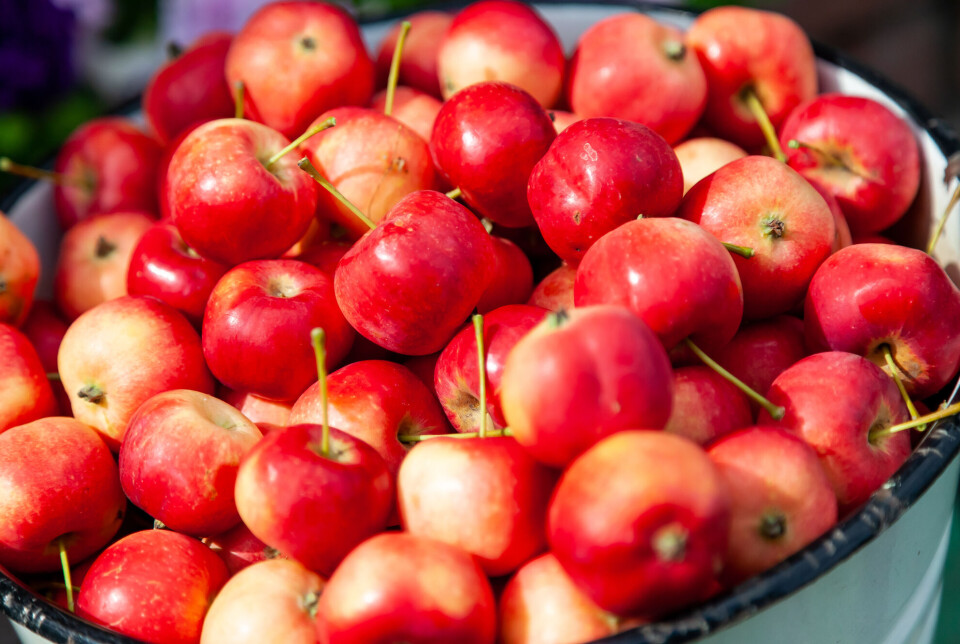
How safe – or dangerous – is eating fruit that has fallen on the ground?
ASK A RESEARCHER: Is it safe to eat apples that have fallen on your lawn? The Norwegian Food Safety Authority warns that windfall fruit can contain toxins – but this is very unlikely if it is not bruised.
Many people nibble on apples and plums that have fallen from their trees without thinking much about it.
But is it completely harmless to eat fallen fruit or fresh-pressed apple juice made from such apples?
According to the Norwegian Food Safety Authority, the answer is no.
The Norwegian Food Safety Authority generally advises people not to eat fruit that has fallen to the ground. The reason is that moulds can produce toxins in the fruit, says senior adviser Hanne-Marit Gran.
Mould loves moisture, and it grows on fallen fruit where it finds enough nutrition and moisture, she says.
Most viewed
Can cause nausea and vomiting
Apples on the ground may have a mould that produces the mycotoxin patulin. The toxin often occurs on apples that are partially rotted.
Patulin can cause nausea, vomiting and diarrhoea.
“These symptoms are generally mild and disappear when you stop eating the contaminated food,” Gran says.
She works at the Norwegian Food Safety Authority's section for chemical food safety.
Patulin also has the potential to damage immune cells and negatively affect the immune system.
So munching on a lot of apples, pears and plums that have fallen to the ground might not be so wise.
The same applies to drinking juice that is pressed from fallen fruit.

Is fungal infection visible?
Gran offers more specifics on the toxin risk.
“The mould attacks fruit that has fallen to the ground and that has bruised and spoiled. It can happen quite quickly,” says Gran.
In particular, the fungus can attack quickly when it is raining and the ground is wet.
The fungus needs no more than one to two days to form in wet weather, she says.
Discard apples with brown spots
You should avoid eating fruit if you don’t know when it fell.
“You have to be careful with fruit that has been on the ground for a while. Apples that are rotting or have brown spots should be avoided altogether,” says Gran.
Just cutting out the brown spoiled spots and eating the rest does not make the fruit safe.
Research has shown that the toxin produced by the fungus can spread inside the pulp.
Unbruised drops are safe
On the other hand, eating drops that have fallen on the same day is quite safe.
If you remove the drops every evening, you can safely eat the apples lying on the ground the next morning.
Check for no visible breaks in the skin.
Set limit values for fruit that is sold
Patulin is a mycotoxin produced by the Penicillium and Aspergillus mould genera. It can be found in various foods, especially in fruits like apples, pears and grapes, or in juices, cider and jams made from such fruits.
Fermenting apple juice for alcoholic cider reduces the patulin levels.
Natural patulin contamination in apple juice is a widespread problem worldwide.
Limit values have been set for the content of patulin in food such as fruit products, which must not be exceeded. The limits are lower for children and youth.
Heat treatment does not prevent mycotoxins
Many people cook apples using pulp that looks just fine. However, if mycotoxins are in the fruit they are transferred to the jam or applesauce.
Mycotoxins do not die even if you cook the fruit. They are heat stable, which means they can survive heat treatment.
Using good quality apples for juicing and fermenting for home use is therefore key.
Damage to DNA?
Patulin is also of concern due to other potential adverse effects on human health.
In animal studies, patulin has shown effects indicating that patulin may damage immune system function.
Research also suggests that patulin might cause DNA damage in cells. It could increase the risk of mutations and potentially lead to developing cancer.
No hazardous levels found
Gran also offers some reassurance, saying investigations of Norwegian and foreign products on the Norwegian market have shown that the amount of patulin was generally low.
Consumers can deliver apples to commercial presses and buy apple juice. These businesses must ensure that the goods they receive are of satisfactory quality and that the products they sell are safe to eat and drink.
EFSA, the European authority for food safety, requires them to carry out inspections of the products they process.
Reference:
Inger-Lise Steffensen et.al.: Ranking of substances for monitoring in foods, drinks and dietary supplements – based on risk and knowledge gaps. Vitenskapskomiteen for mat og miljø (Science Committee for Food and the Environment), 2019.
Forskrift om visse forurensende stoffer i næringsmidler. (Regulation of certain pollutants in foodstuffs.) Lovdata. (in Norwegian)
———
Read the Norwegian version of this article at forskning.no






































